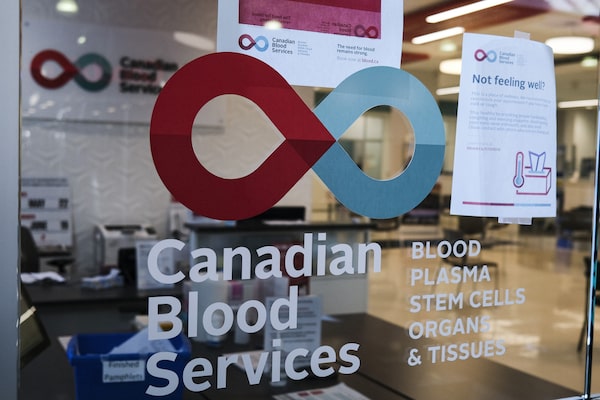
A blood donor clinic at a shopping mall in Calgary in March, 2020.Jeff McIntosh/The Canadian Press
The Ontario and B.C. governments have refused to endorse the view of the head of Canadian Blood Services that an agreement with a Spanish pharmaceutical company should allow the firm to circumvent provincial bans on paid blood plasma collection.
CBS chief executive officer Graham Sher announced last week that the national blood-collection agency had signed a deal with Barcelona-based Grifols to collect from domestic donors more than 50 per cent of the plasma needed in Canada to produce plasma-derived medicine. CBS currently collects just 15 per cent of its needs domestically and buys the rest from international markets.
Plasma is a protein-rich fluid found in blood that is used for transfusions and to make immunoglobulin medicines, which are used to treat a wide range of immunodeficiencies and other medical conditions.
The blood-collection agency is funded by the provinces and has a mandate to accept only voluntary donations, whereas Grifols pays donors in many markets and uses their plasma to manufacture immunoglobulin, which it sells to CBS.
Paid plasma collection is banned in Ontario and B.C., though both provinces have exemptions for CBS. Dr. Sher said last week that, because Grifols is working with CBS, the company should also be exempt from the bans.
However, when contacted by The Globe and Mail, the B.C. and Ontario governments declined to say if they agreed with that interpretation of the law and instead reaffirmed their support for unpaid collection.
“Canadian Blood Services’ network of blood and plasma donor centres will remain voluntary, and Ontario supports this,” said Hannah Jensen, the press secretary for Ontario Health Minister Sylvia Jones.
Opinion: Paying for blood-plasma donations is the answer to our shortages
Matthew Wigmore, a spokesperson for the B.C. Ministry of Health, said the province passed the Voluntary Blood Donations Act in 2018 to prohibit organizations from paying donors for blood and plasma donations.
“The Act was brought into force to: protect the public blood system from encroachment by the private sector; ensure that plasma collected from British Columbians was used to treat patients in Canada; and to prevent private entities from exploiting an essential resource and the individuals who generously donate blood,” Mr. Wigmore said in an e-mail. “The province looks forward to further discussions about additional actions to increase plasma sufficiency.”
Quebec, which has its own blood-collection agency and also prohibits paid donations, has previously said it has no plans to work with private plasma collectors. The province invested in a network of new collection centres that it says will get it to 42-per-cent self-sufficiency through voluntary donations.
Grifols has not responded to requests for comment since The Globe and Mail began contacting the company in August. CBS declined to help facilitate contact with the company when asked this week.
Ontario’s ban, the Voluntary Blood Donations Act, was passed in 2014 in response to interest from a private Canadian company, Canadian Plasma Resources (CPR), to set up shop in the province. After the law passed, CPR moved west and now operates in Alberta, Saskatchewan and Manitoba, as well as New Brunswick.
CPR chief executive officer Barzin Bahardoust has said he hopes the deal with Grifols prompts Ontario to reconsider its ban. He said his company would open 10 to 20 collection centres in the province if it could.
The language of the loophole is different in Ontario and B.C. In Ontario, it references only CBS; in B.C., it says the exemption covers CBS and its “agents and successors.”
A CBS risk analysis about different ways to boost plasma supply, which the agency released on the same day it announced its deal with Grifols, described an exemption for CBS’s agents as “explicit” in the B.C. law and “implicit” in the Ontario law.
Curtis Brandell, the president of the B.C. chapter of the Canadian Hemophilia Society, said he thought the B.C. government’s statement sent a message to private plasma firms that they were not welcome in the province – a message he supports.
(The B.C. chapter works independently of the national group, which is in favour of the Grifols deal.)
Mr. Brandell, who participated in the drafting of the 2018 law as a stakeholder, said his understanding of the exemption in B.C.’s ban was that it could be exercised by CBS temporarily in the event of a major supply-chain disruption, such as a war.
“It was not a legal loophole to drive a semi-truck-sized, long-term deal with an international plasma broker” through, he said.